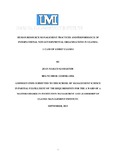| dc.contributor.author | KASEKENDE, Joan Makayi | |
| dc.contributor.author | Barifaijo, Maria Kaguhangire(Supervisor) | |
| dc.contributor.author | Kyohairwe, Stella (Supervisor) | |
| dc.date.accessioned | 2017-07-31T10:42:22Z | |
| dc.date.available | 2017-07-31T10:42:22Z | |
| dc.date.issued | 2015-09 | |
| dc.identifier.citation | APA | en_US |
| dc.identifier.other | 12/MIML/2/026 | |
| dc.identifier.uri | http://hdl.handle.net/20.500.12305/266 | |
| dc.description | A Dissertation Submitted to the School of Management Science in Partial Fulfillment of the Requirements for the a ward of a Masters Degree in Institution Management and Leadership of Uganda Management Institute | en_US |
| dc.description.abstract | The study examined the relationship between Human Resource practices and performance of international Non-Government Organisations management in Uganda. The study was premised on the following research objectives: to establish the relationship between performance management and effectiveness of management of International NGOs, to establish the relationship between training and effectiveness of management of International NGOs, to establish the relationship between rewards and effectiveness of management of International NGOs and to establish the relationship between employee involvement in decision making and effectiveness of International NGOs. The study employed a cross sectional survey design and both quantitative and qualitative approaches. In total, a sample of 50 respondents was observed who included top, middle and lower level staff. In collecting the data, the researcher used questionnaires and interviews and data was analyzed using the Pearson correlation coefficient. The study findings revealed that that there is a positive significant relationship between performance management and effectiveness of management of International NGOs, further more findings revealed that there is a positive significant relationship between training and performance of AMREF, further more findings revealed that there is a positive significant relationship between rewards and performance of AMREF and lastly job design and employee involvement in decision making and performance of AMREF are positively significantly related. It was concluded that: The majority indicated that they are dissatisfied with the nature and expertise of the trainers, while the minorities were not satisfied nature and expertise of the trainers. The majority of the respondents agreed that the company needs to plan before undertaking trainings. These results showed that employee involvement in decision making explained a strong variation in effectiveness of management meaning that employee involvement in decision making is a motivating factor. It was recommended that the performance appraisal programme in AMREF should be well thought out and tailored for the firm. The appraisal process must be viewed as a continuous activity rather than a one-a-year event. Managers should be encouraged to engage in careful, systematic and professional planning and implementation of the performance management system. The trainings should aim at fulfilling the designated objectives of the company. Training should also be linked to the needs of the employees and the organisation. A reward system that rewards high performance and discourages low and mediocre performance should be put in place. A comprehensive and holistic reward system, which includes various rewards such as financial rewards, public acknowledgments, merit awards, promotions, greater work responsibilities, learning and study opportunities, should be developed and communicated to staff. Much greater emphasis must be given to non-monetary rewards. | en_US |
| dc.language.iso | en | en_US |
| dc.publisher | Uganda Management Institute | en_US |
| dc.subject | Human Resource Management Practices | en_US |
| dc.subject | International Non Governmental Organisations | en_US |
| dc.title | Human Resource Management Practices and Performance of International Non Governmental Organisations in Uganda:A case of Amref Uganda | en_US |
| dc.type | Book | en_US |

